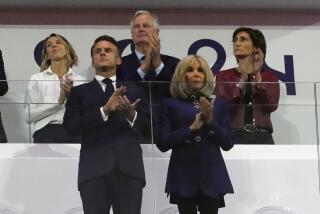French Rightists Divided on Runoff : Elections: After beating the Socialists, the conservatives are at odds over which candidates to field in voting Sunday.
- Share via
PARIS — Only hours after trouncing the governing Socialist Party in the first round of French parliamentary elections, the leading alliance of moderate right-wing political parties suffered its first division Monday over which candidates to field in runoff elections set for Sunday.
Former President Valery Giscard d’Estaing, leader of the French Democratic Union, angered his alliance partners, the Rally for the Republic party led by Paris Mayor Jacques Chirac, when he appeared to back away from a pre-election agreement among the two parties and their smaller partner, the Republican Party.
Under the pact, the three conservative parties agreed not to contest in next Sunday’s second-round runoff any district in which a candidate from one of their alliance received a higher percentage of the vote than in the first round.
After the Sunday vote, however, Giscard d’Estaing and his party secretary, Francois Bayrou, said they favored letting conservative party candidates fight it out when there was no chance of a left-wing candidate winning as a result.
The conservative alliance fielded single candidates in most of the 577 parliamentary districts. But in 69 districts, Rally for the Republic (RPR) and French Democratic Union (UDF) candidates opposed one another, setting up the conflict when both candidates qualified for the runoff.
“We’re only talking about a handful of constituencies,” said Bayrou, “only 10 to 12 where only the UDF and RPR are left in the contest.”
At stake, however, could be the job of prime minister in the new government. When President Francois Mitterrand names his choice to head the new conservative government next week, the new prime minister probably will come from the party that holds the most seats in Parliament.
Whichever party has its candidate installed as prime minister is likely to lead the conservatives in the 1995 presidential elections. Both Chirac, 61, and Giscard d’Estaing, 67, continue to have undisguised ambitions for the presidential nomination in 1995.
Projections show Chirac’s Rally for the Republic winning 20 more seats in Parliament than Giscard d’Estaing’s Democratic Union. The difference could be cut if the Democratic Union were allowed to challenge Rally for the Republic candidates in individual races.
The procedural split among the conservative alliance is unlikely to greatly affect the final results of the two-stage parliamentary vote, where projections show the moderate right parties winning as many as four-fifths of the 577 seats in the National Assembly.
But it was an early example of the kind of schisms the badly defeated Socialists hope to foster between the two main conservative parties in Parliament before presidential elections in 1995, when lame-duck Mitterrand, 76, comes to the end of his second and final seven-year term.
As an alliance, the three conservative parties were able to deal the French left its worst defeat in this century. The Socialists are not expected to win more than 80 seats after the second round of voting, compared to as many as 480 for the parties of the conservative union.
As individual political units, however, the two main conservative parties are not much stronger than the decimated Socialists, who watched their score drop from 34% of the vote in 1988 parliamentary elections to only 17.6% Sunday.
The more successful of the conservative parties, the neo-Gaullist Rally for the Republic led by Chirac, won only 20% of the vote. The Democratic Union, led by Giscard d’Estaing, finished with 19%.
More to Read
Sign up for Essential California
The most important California stories and recommendations in your inbox every morning.
You may occasionally receive promotional content from the Los Angeles Times.













